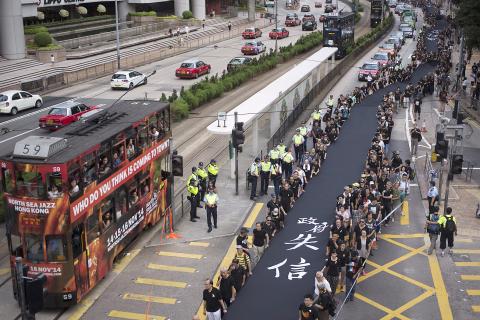Thousands of pro-democracy activists clad in black marched silently through Hong Kong yesterday, holding banners saying they felt betrayed and angry at Beijing’s refusal to allow fully democratic elections for the territory’s next chief executive in 2017.
The protesters, who carried enormous black cloth ribbons through the streets, also held up signs calling for further civil disobedience and cheering on students planning to boycott classes.
“Occupy Central with Love and Peace,” and “Support students boycotting classes,” read some of the signs.

Photo: EPA
“Beijing has breached our trust. Universal suffrage is hopeless,” read another.
Dozens of pro-establishment protesters gathered nearby waving banners and cursing the democracy activists and students.
“Students should focus on studying,” shouted Pok Chun-chung, an organizer of the pro-establishment “Protect Hong Kong” movement. “If you adults have guts then you should occupy Central yourself, not use children as cannon fodder.”
The protest remained peaceful and police stood by. Organizers estimated there were about 4,000 marchers at the height of the protest. Police estimated 1,860.
Yesterday’s march was the latest in a series of confrontations between pro-democracy activists and pro-establishment forces over the extent to which Hong Kong may go ahead with democratic reforms.
A former British colony, Hong Kong was returned to Chinese rule in 1997 under a “one country, two systems” form of government. It was given wide-ranging autonomy, including an undated promise of “universal suffrage.”
Beijing this summer has made it clear it would not allow fully democratic elections in the near future. Pro-democracy activists say China’s decision to tightly control who can be nominated for the 2017 vote means Hong Kong risks ending up with a “fake” democracy.
Earlier yesterday, Hong Kong Chief Executive Leung Chun-ying (梁振英) published an open letter to residents of the territory, urging them to be “pragmatic” and to form an “accurate and complete understanding of the constitutional and political context in which we find ourselves.”
He said constitutional reform should move forward whatever the pace and that there could be additional reforms in the future.

MAKING WAVES: China’s maritime militia could become a nontraditional threat in war, clogging up shipping lanes to prevent US or Japanese intervention, a report said About 1,900 Chinese ships flying flags of convenience and fishing vessels that participated in China’s military exercises around Taiwan last month and in January last year have been listed for monitoring, Coast Guard Administration (CGA) Deputy Director-General Hsieh Ching-chin (謝慶欽) said yesterday. Following amendments to the Commercial Port Act (商港法) and the Law of Ships (船舶法) last month, the CGA can designate possible berthing areas or deny ports of call for vessels suspected of loitering around areas where undersea cables can be accessed, Oceans Affairs Council Minister Kuan Bi-ling (管碧玲) said. The list of suspected ships, originally 300, had risen to about

DAREDEVIL: Honnold said it had always been a dream of his to climb Taipei 101, while a Netflix producer said the skyscraper was ‘a real icon of this country’ US climber Alex Honnold yesterday took on Taiwan’s tallest building, becoming the first person to scale Taipei 101 without a rope, harness or safety net. Hundreds of spectators gathered at the base of the 101-story skyscraper to watch Honnold, 40, embark on his daredevil feat, which was also broadcast live on Netflix. Dressed in a red T-shirt and yellow custom-made climbing shoes, Honnold swiftly moved up the southeast face of the glass and steel building. At one point, he stepped onto a platform midway up to wave down at fans and onlookers who were taking photos. People watching from inside

Japan’s strategic alliance with the US would collapse if Tokyo were to turn away from a conflict in Taiwan, Japanese Prime Minister Sanae Takaichi said yesterday, but distanced herself from previous comments that suggested a possible military response in such an event. Takaichi expressed her latest views on a nationally broadcast TV program late on Monday, where an opposition party leader criticized her for igniting tensions with China with the earlier remarks. Ties between Japan and China have sunk to the worst level in years after Takaichi said in November that a hypothetical Chinese attack on Taiwan could bring about a Japanese

The WHO ignored early COVID-19 warnings from Taiwan, US Deputy Secretary of Health and Human Services Jim O’Neill said on Friday, as part of justification for Washington withdrawing from the global health body. US Secretary of State Marco Rubio on Thursday said that the US was pulling out of the UN agency, as it failed to fulfill its responsibilities during the COVID-19 pandemic. The WHO “ignored early COVID warnings from Taiwan in 2019 by pretending Taiwan did not exist, O’Neill wrote on X on Friday, Taiwan time. “It ignored rigorous science and promoted lockdowns.” The US will “continue international coordination on infectious